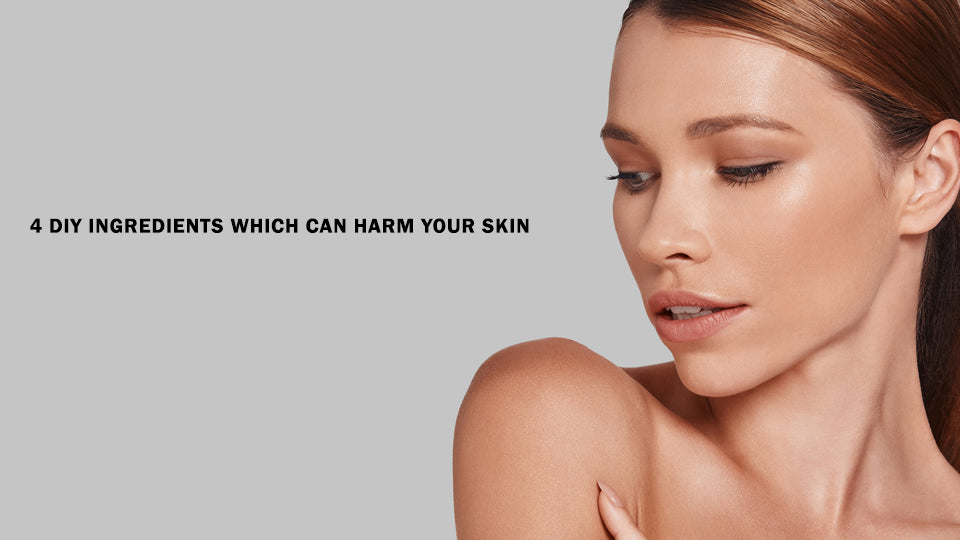4 DIY Ingredients Which Can Harm Your Skin

Beware!!! Some common DIY ingredients can harm your skin. DIYs are trending these days over the internet and people are ready to experiment with homemade face masks, scrubs, and cleansers that are easy and convenient to use. But, before you kickstart with any of these, it is important to remember that some DIYs can harm your skin.
Some DIY skin ingredients can cause skin inflammation which may be difficult to deal with. So, let us get started to give you some insights into what a DIY is and how it should be used correctly. It is important to avoid the use of certain DIYs which may result in breakout, irritation, inflammation, and more
What is DIY?
DIY means Do-It-Yourself. This is a process of creating, and modifying your homemade solution to treat your concerns instead of hiring a professional expert. DIY skin ingredients are generally picked up from home or kitchen cabinets.
Making your skincare solutions at home can be very beneficial for the skin sometimes. However, you need to be careful with the ingredients which you choose. If you have skin concerns, it is advisable to be careful with DIY skin solutions so that it does not harm the skin.
Top 4 DIY Ingredients To Avoid For The Skin
1. Lemon
Lemon is a potent antioxidant for the skin. It is enriched with Vitamin C. This is one of the best skin brighteners which works great for the skin. However, it is advisable to take care while using it, especially in cases of sensitive skin. It can turn acidic and leave the skin raw and irritated. Similarly, you should be careful about fruit extracts which may aggravate the skin further.
The best choice is to use this as a quick home remedy for Vitamin C internally in the form of lemon water. Also, you can opt for pure natural Vitamin C serum which works wonders for the skin.
2. Sugar
Sugar is used as a skin-scrubbing home solution which works great as a skin exfoliant. Here it is important to choose the correct size and shape of sugar granules. Fine granules work better than coarse granules. However, the quality of the sugar granules may differ at times and this may damage the skin pores.
3. Cinnamon
Cinnamon is a well-known spice. Using cinnamon regularly may irritate and damage the skin. It is recommended never to do this too often or leave this product on the skin for a longer time. They may tend to harm the skin after long-term usage. It is also important to do a patch test or spot test before you use cinnamon as a DIY.
It is recommended to use skincare products with natural extracts of cinnamon which work amazing for the skin.
4. Apple cider vinegar
Apple cider vinegar is mostly considered a common DIY home toner. This has pH-balancing properties but is definitely not a dermatologist-approved trick. The harmful effects of using apple cider vinegar may cause irritation, sunburn, or chemical burn due to repetitive application.
5. Toothpaste
This is one of the best hacks for pimples and acne. It helps shrink the pimples to clear them. If you are a DIY toothpaste fan, you must try using this once in a while only on the affected area. Do not use it on the entire face. It is advisable to use it only on the concerned area such as active pimples or acne. This has the tendency to kill the bacteria forming acne and clear the skin pores from within. However, do not overdo it.
6. Raw eggs
Raw eggs mask is one of the famous DIYs that has been trending over the internet. It has a skin-tightening effect and helps reduce pores to eliminate breakouts. It helps in firming and repairing issues of the skin. Egg masks are rich in protein which has collagen synthesis effects.
However, if you are prone to allergies, it is advisable not to use a raw egg mask which may aggravate the skin condition. Instead, you can opt for collagen-boosting elements in face masks which have good anti-aging benefits.
The Final Takeaway
After these insights on DIY skin ingredients, it is recommended to switch over to natural skincare products which are authentic, trustworthy, and genuine. They are safe for the skin as they are medically tested compared to DIY home-made solutions.